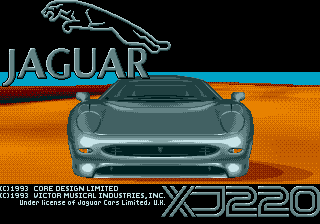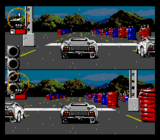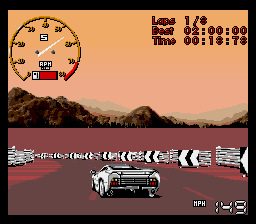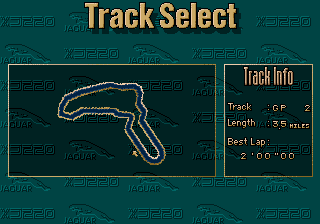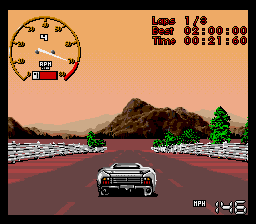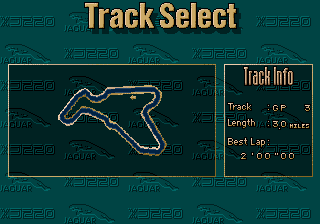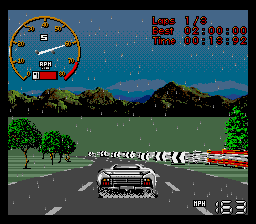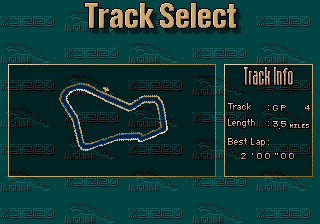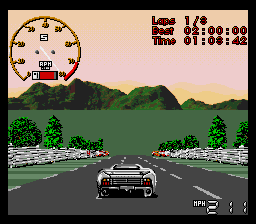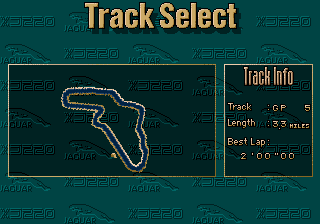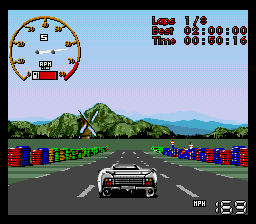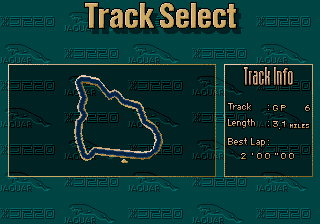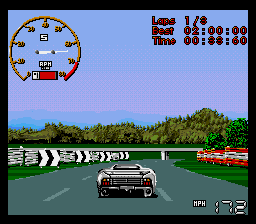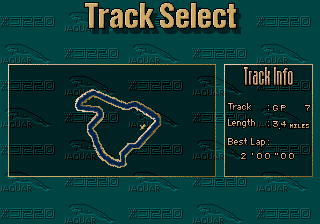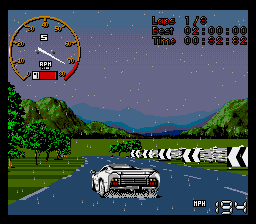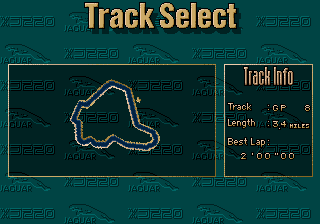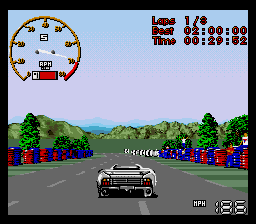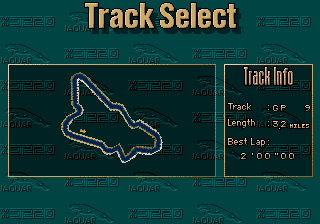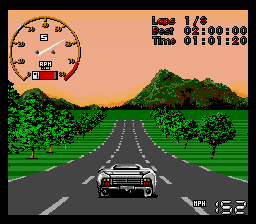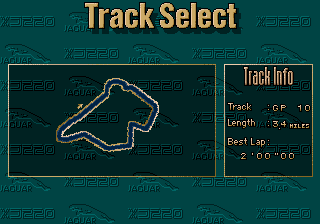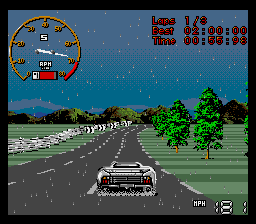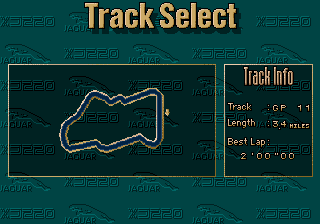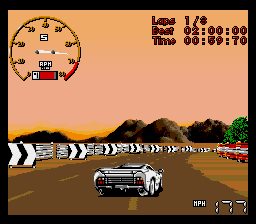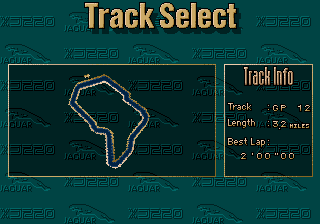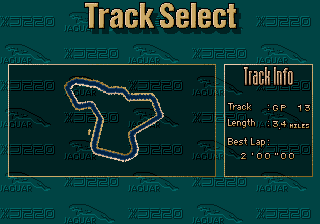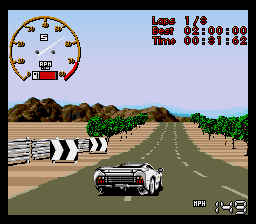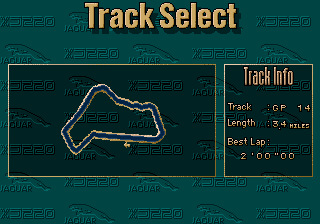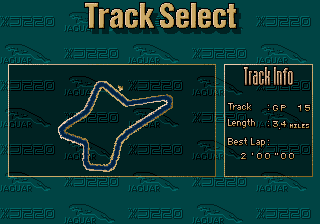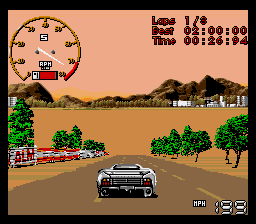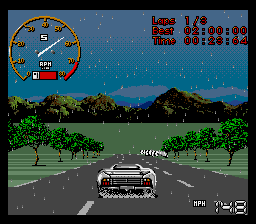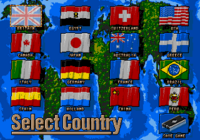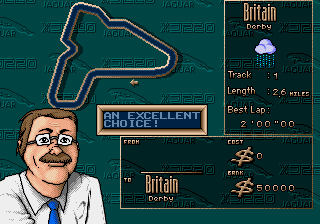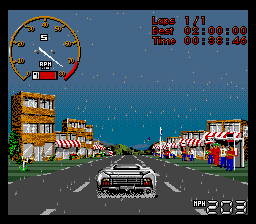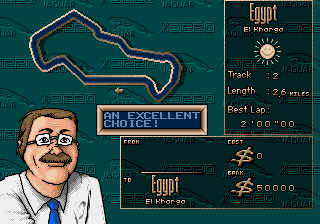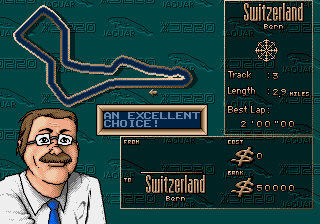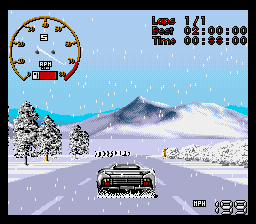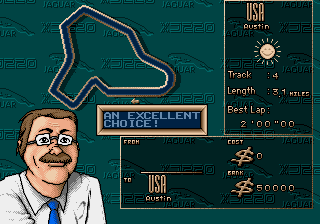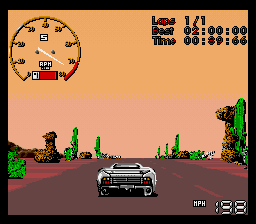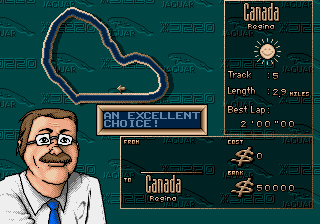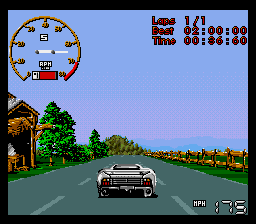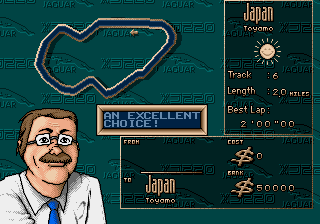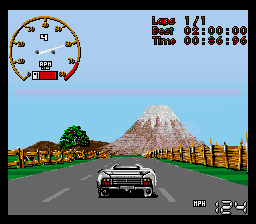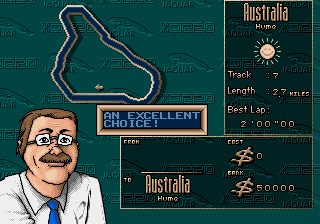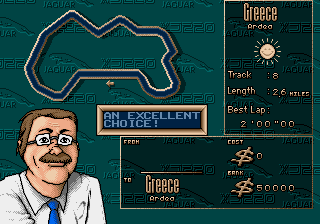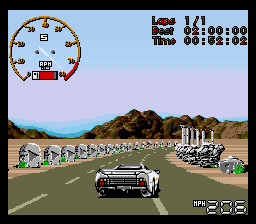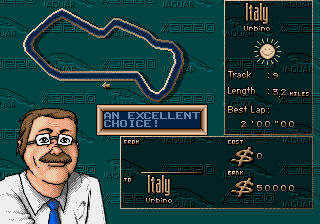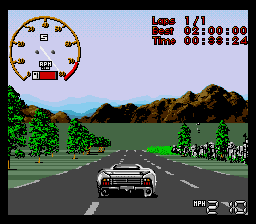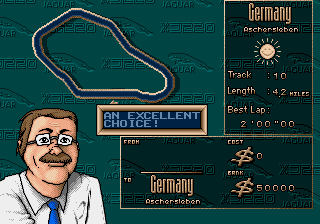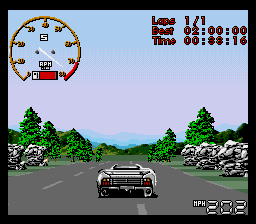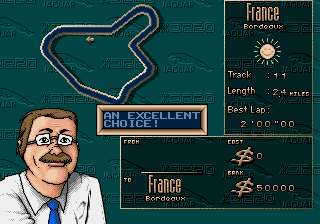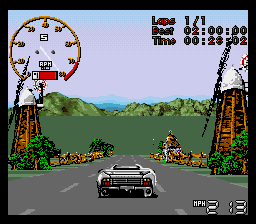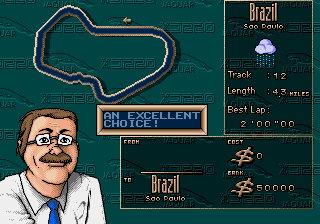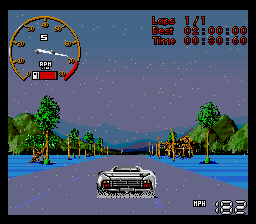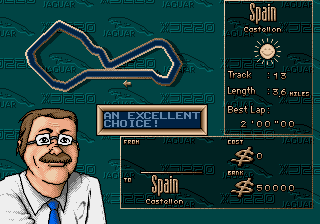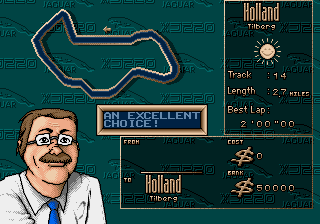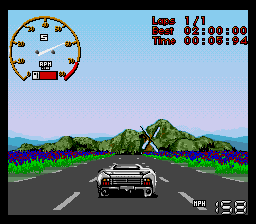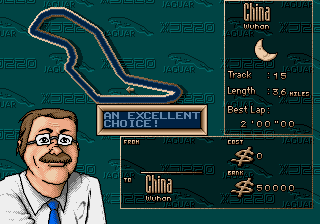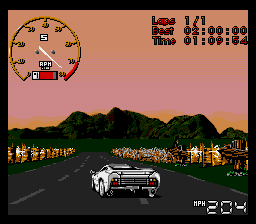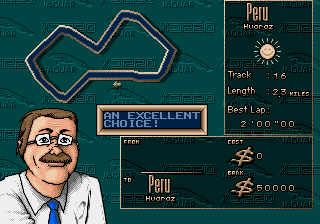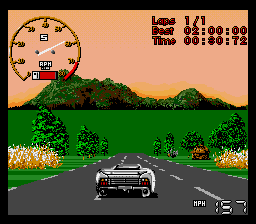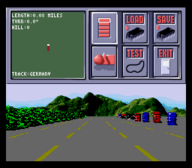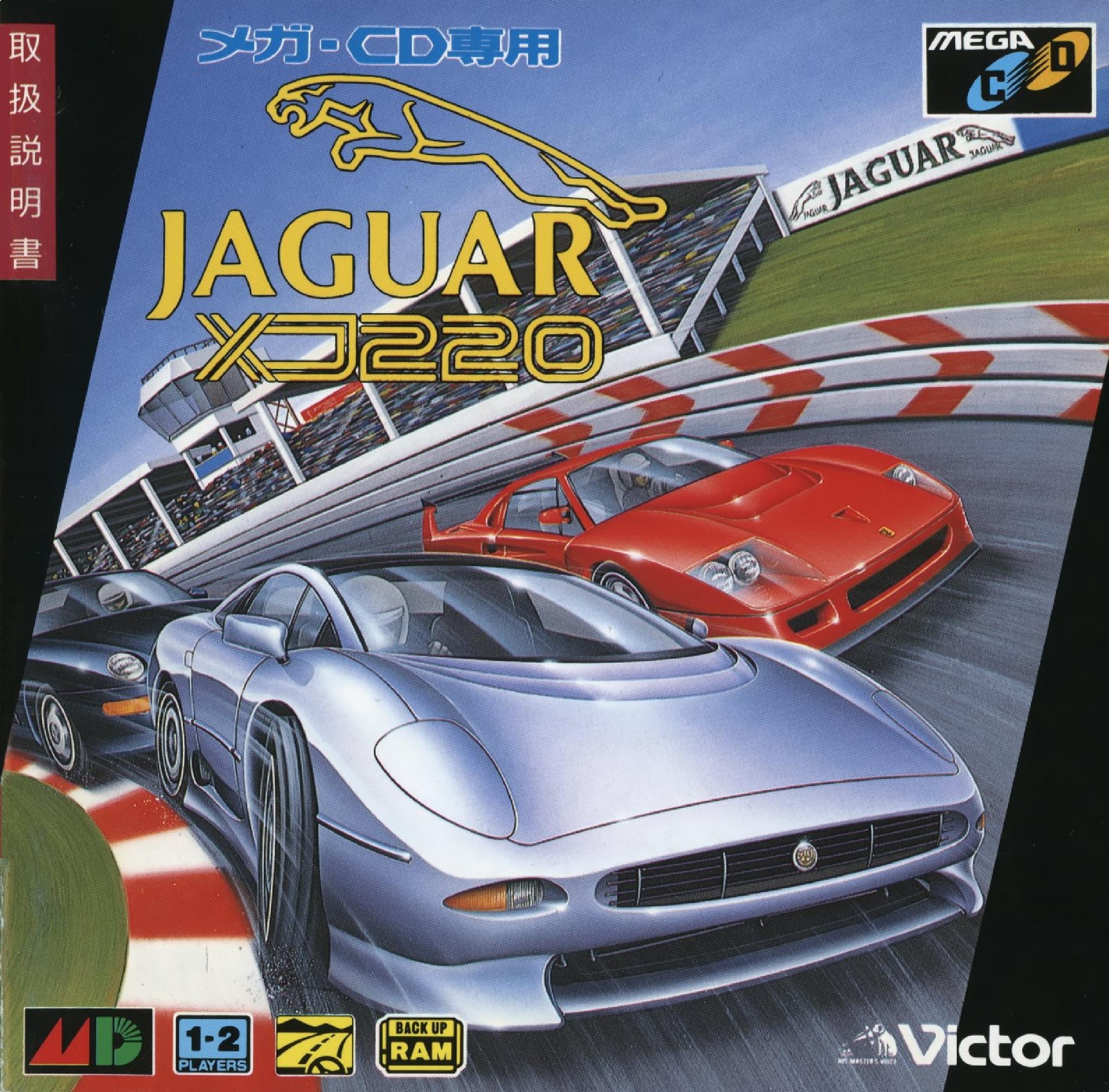Jaguar XJ220
From Sega Retro
| ||||||||||||||||||||||||||||||||||||||||||||||||||
| Jaguar XJ220 | ||||||||||||||||||||||||||||||||||||||||||||||||||
|---|---|---|---|---|---|---|---|---|---|---|---|---|---|---|---|---|---|---|---|---|---|---|---|---|---|---|---|---|---|---|---|---|---|---|---|---|---|---|---|---|---|---|---|---|---|---|---|---|---|---|
| System(s): Sega Mega-CD | ||||||||||||||||||||||||||||||||||||||||||||||||||
| Publisher: JVC Musical Industries (US), Sega Europe (Europe), Victor Musical Industries (Japan) | ||||||||||||||||||||||||||||||||||||||||||||||||||
| Developer: Core Design | ||||||||||||||||||||||||||||||||||||||||||||||||||
| Distributor: Ecofilmes (PT), Samsung (KR) | ||||||||||||||||||||||||||||||||||||||||||||||||||
| Licensor: Jaguar Cars | ||||||||||||||||||||||||||||||||||||||||||||||||||
| Peripherals supported: CD BackUp RAM Cart | ||||||||||||||||||||||||||||||||||||||||||||||||||
| Genre: Racing[1] | ||||||||||||||||||||||||||||||||||||||||||||||||||
| Number of players: 1-2 | ||||||||||||||||||||||||||||||||||||||||||||||||||
| ||||||||||||||||||||||||||||||||||||||||||||||||||
|
Jaguar XJ220 (ジャガーXJ220) is a racing game developed by Core Design for the Sega Mega-CD. Similar to the Lotus series, the game is centered around one brand of car, in this case, the Jaguar XJ220, which was the fastest production car in the world at the time (until it was dethroned by the McLaren F1 in 1994).
Contents
Gameplay
The game is a racing game where the player drives a Jaguar XJ220. The car is steered with ![]() and
and ![]() , accelerates with
, accelerates with ![]() or
or ![]() , and brakes with
, and brakes with ![]() . The car is equipped with an automatic transmission by default, but if equipped with a manual transmission, it is upshifted with
. The car is equipped with an automatic transmission by default, but if equipped with a manual transmission, it is upshifted with ![]() and downshifted with
and downshifted with ![]() .
.
There are three modes: the Grand Prix mode, where the player participates in 16 different races; the World Tour mode, where the player travels to 16 different countries; and the Free Practice mode, where the player can choose from any of the 32 tracks of the other modes. All modes can be played alone or with another player in split-screen mode. Players can also choose whether races consist of 3, 5, 7, or 9 laps. The car has limited fuel and must make pit stops to refuel in races longer than 3 laps. There is also a Track Editor that allows players to create their own tracks to race on.
In the Grand Prix and World Tour modes, the cars take damage on parts such as body panels whenever they collide with other cars or roadside objects as well as suffering wear on parts such as tires. Cars can be repaired after each race. Repairs cost money, which is earned by completing races. The condition of the part is conveyed by its color. Green parts are in good condition and do not need to be replaced. Yellow parts are worn but functional, though they may perform sub-optimally. Red parts are severely damaged and must be repaired to proceed. It costs the same to repair a yellow part as it does a red part, so the player can strategically choose to wait until a part is red before repairing it. The game cannot be continued if the player has red parts but not enough money to repair them.
Grand Prix
The Grand Prix mode takes players through a series of races on 16 different tracks. The tracks are played in series and cannot be selected (except in Free Practice mode). Each race has 20 contestants and is preceded by a qualifying lap that determines the player's starting position. Players can also play practice laps to learn the track before attempting to qualify. Players are awarded prize money depending on their position at the end of each race, which can be spent repairing their cars. The game can be saved after each race.
| Round 1 | |
|---|---|
| Round 2 | |
| Round 3 | |
| Round 4 | |
| Round 5 | |
| Round 6 | |
| Round 7 | |
| Round 8 | |
| Round 9 | |
| Round 10 | |
| Round 11 | |
| Round 12 | |
| Round 13 | |
| Round 14 | |
| Round 15 | |
| Round 16 | |
World Tour
The World Tour mode is similar to Grand Prix, but the player can choose the location of each race. In free-player games, player one chooses the next country. The player can start at any country and must pay a certain amount to travel to the next country depending on its distance from the previous location. The player has a Financial Advisor who evaluates the player's decision of country and may suggest a closer country instead, though the player is free to ignore his advice. There are 16 total countries. The game ends if the player can no longer afford to continue because of travel costs or repair costs.
Like Grand Prix mode, each race is preceded by a qualifying lap that determines the player's starting position, out of 20 positions. Players are awarded prize money depending on their position at the end of each race, which can be spent repairing their cars. The game can be saved after each race.
| Derby, Britain | |
|---|---|
| El Kharga, Egypt | |
| Bern, Switzerland | |
| Austin, USA | |
| Regina, Canada | |
| Toyamo, Japan | |
| Hume, Australia | |
| Ardea, Greece | |
| Urbino, Italy | |
| Aschersleben, Germany | |
| Bordeaux, France | |
| São Paulo, Brazil | |
| Castellón, Spain | |
| Tilberg, Holland | |
| Wuhan, China | |
| Huaraz, Peru | |
Free Practice
Free Practice mode lets the player choose any of the 32 tracks from the Grand Prix and World Tour modes to race on. In two-player games, player one chooses the track. Unlike the other modes, there is no qualifying lap and there are no AI opponents.
Track Editor
The Track Editor allows the player to create custom tracks on any of the 16 countries from the Grand Prix and World Tour modes. The editor shows an overhead view of the course as well as a view from on the road. Tracks can be saved to and loaded from the Mega-CD's internal memory. They can be test driven at any point during the construction process. A track must make a complete circuit before it can be saved, though it can be tested even if it is incomplete. Menu items are selected with the D-Pad and confirmed with ![]() or
or ![]() , and the player can go back with
, and the player can go back with ![]() .
.
The course designer lets the player shape the road one segment at a time. A road segment can be added with HOLD ![]()
![]() or removed with HOLD
or removed with HOLD ![]()
![]() . The player can change the selected road segment with
. The player can change the selected road segment with ![]() and
and ![]() . The current road section can be curved into a corner with HOLD
. The current road section can be curved into a corner with HOLD ![]()
![]() or
or ![]() . Hills or dips are added with HOLD
. Hills or dips are added with HOLD ![]()
![]() or
or ![]() .
.
The object editor allows the player to place roadside objects to decorate the track, such as chevrons, trees, or even tunnels. Objects are sorted between the left side of the road, the right side of the road, and the center. As in the course designer, the player can move up and down the road with ![]() and
and ![]() . The player can select an object from the menu using the D-Pad and place the selected object with
. The player can select an object from the menu using the D-Pad and place the selected object with ![]() .
.
Competitors
Core Design only had the rights to use the Jaguar name but nevertheless includes supercars by other manufacturers under fictionalized names, including Ferrino (Ferrari) and Bezantti (Bugatti).
| Team | Car | Country |
|---|---|---|
| Jaguar | Jaguar XJ220 | Britain |
| Berantti | Berantti 4000 | Italy |
| Ferrino | Ferrino Special | Italy |
| Osaka | Osaka Wasp | Japan |
| Phoenix | Hathaway Phoenix | USA |
| Raphale | Raphale Charger | France |
| Shtuck | Shtuck Alpino | Germany |
| Tomahawk | Tomahawk Laser | USA |
| Berago | Berago Lanchetta | Italy |
Versions
Core Design released Jaguar XJ220 for the Amiga in 1992, but while it shares the same name and a similar concept to the Mega-CD version, the two are very different aesthetically. In addition to full motion video sequences and a CD audio soundtrack, the Mega-CD version uses hardware sprite scaling, more detailed graphics and adds qualifying laps to proceedings, as well as completely overhauling the menus.
On the Amiga, Core used real opponent supercars despite not having a license to do so. They are not referenced in game, but the Porsche 911, Lamborghini Countach, Ferrari F40 and Nissan Skyline are all visible, as are advertisements for Computer and Video Games magazine, all of which were removed in the Mega-CD version.
Production credits
- Producer: Jeremy Heath-Smith
- Programmer: Mark Avory
- Artist: Jason Gee
- Game Design: Mark Price
- Music: Martin Iveson
- Executive Producer: Satoshi Honda
- Producer: Isamu Senda
- Chief Director: Toshiyuki Nagai
- Director: Gaku Sato
- Marketing: Harunobu Komori, Katsumi Arai, Toshimichi Kawamura, Tatsuo Tateishi, Shunji Nishizawa, Kouki Minami, Kaku Maetani, Yae Uchida, Katsura Iino
- Illustration: Akio Nakamura
- Package and Manual Design: Mir (Y. Yajima)
- Manual: Etsuko Matsuoka
- Play Testing: Nobuaki Horie, Ryou Misawa
- Special Thanks: Takeshi Minagawa, Kaoru Tomiyama, Yasushi Endo, Kazuya Tominaga, Takashi Kimura
Magazine articles
- Main article: Jaguar XJ220/Magazine articles.
Promotional material
also published in:
- (JP) #1993-04: "April 1993" (1993-03-08)[12]
Artwork
Physical scans
| Sega Retro Average | |||||||||||||||||||||||||||||||||||||||||||||||||||||||||||||||||||||||||||||||||||||||||||||||||||||||||||||||||||||||||||||||||||||||||||||||||||||||||||||||||||||||||||||||||||
|---|---|---|---|---|---|---|---|---|---|---|---|---|---|---|---|---|---|---|---|---|---|---|---|---|---|---|---|---|---|---|---|---|---|---|---|---|---|---|---|---|---|---|---|---|---|---|---|---|---|---|---|---|---|---|---|---|---|---|---|---|---|---|---|---|---|---|---|---|---|---|---|---|---|---|---|---|---|---|---|---|---|---|---|---|---|---|---|---|---|---|---|---|---|---|---|---|---|---|---|---|---|---|---|---|---|---|---|---|---|---|---|---|---|---|---|---|---|---|---|---|---|---|---|---|---|---|---|---|---|---|---|---|---|---|---|---|---|---|---|---|---|---|---|---|---|---|---|---|---|---|---|---|---|---|---|---|---|---|---|---|---|---|---|---|---|---|---|---|---|---|---|---|---|---|---|---|---|---|---|
|
| 74 | |
|---|---|
| Based on 35 reviews | |
| Mega-CD, BR |
|---|
|
Technical information
- Main article: Jaguar XJ220/Technical information.
References
- ↑ 1.0 1.1 https://sega.jp/fb/segahard/mcd/soft_licensee.html (Wayback Machine: 2019-06-10 17:56)
- ↑ https://groups.google.com/g/rec.games.video/c/8w5batTvqzg/m/sUBDKxmTNXoJ
- ↑ GamePro, "March 1993" (US; 1993-xx-xx), page 141
- ↑ 4.0 4.1 MegaTech, "April 1993" (UK; 1993-03-20), page 29
- ↑ 5.0 5.1 Mean Machines Sega, "April 1993" (UK; 1993-03-26), page 40
- ↑ Sega Pro, "May 1993" (UK; 1993-04-08), page 18
- ↑ Mega, "April 1993" (UK; 1993-03-18), page 26
- ↑ Mega Power, "February 1994" (UK; 1994-01-20), page 74
- ↑ Select Round, "Septembre 1993" (FR; 1993-xx-xx), page 2
- ↑ 10.0 10.1 10.2 Sega Magazin, "September/Oktober 1993" (DE; 1993-09-01), page 16
- ↑ File:JaguarXJ220 MD jp manual.pdf, page 26
- ↑ Beep! MegaDrive, "April 1993" (JP; 1993-03-08), page 13
- ↑ Svet Kompjutera, "Jul/Avgust 1995" (YU; 1995-xx-xx), page 2
- ↑ Svet Kompjutera, "Septembar 1995" (YU; 1995-xx-xx), page 32
- ↑ 1700 igr dlya Sega, "" (RU; 2001-xx-xx), page 99
- ↑ Beep! MegaDrive, "April 1993" (JP; 1993-03-08), page 22
- ↑ Computer & Video Games, "July 1993" (UK; 1993-06-15), page 107
- ↑ Computer & Video Games, "August 1993" (UK; 1993-07-15), page 52
- ↑ Computer & Video Games, "May 1994" (UK; 1994-04-15), page 112
- ↑ Mean Machines: The Essential Sega Guide, "" (UK; 1993-11-18), page 121
- ↑ Famitsu, "1993-04-02" (JP; 1993-03-19), page 1
- ↑ GameFan, "Volume 1, Issue 7: June 1993" (US; 1993-xx-xx), page 16
- ↑ Game Players, "Vol. 6 No. 8 August 1993" (US; 1993-0x-xx), page 122
- ↑ Game Power, "Giugno 1993" (IT; 1993-0x-xx), page 46
- ↑ GamePro, "March 1993" (US; 1993-xx-xx), page 140
- ↑ GamesMaster, "June 1993" (UK; 1993-05-20), page 76
- ↑ Game Informer, "May/June 1993" (US; 1993-0x-xx), page 32
- ↑ Hobby Consolas, "Septiembre 1993" (ES; 1993-xx-xx), page 124
- ↑ Joypad, "Septembre 1993" (FR; 1993-0x-xx), page 77
- ↑ Joypad, "1/1994" (HU; 1994-xx-xx), page 16
- ↑ Sega Mega Drive Advanced Gaming, "May 1993" (UK; 1993-xx-xx), page 20
- ↑ Mega, "June 1993" (UK; 1993-05-20), page 46
- ↑ Mega Action, "July 1993" (UK; 1993-06-17), page 37
- ↑ Mega Force, "Mega-CD Force: Le Supplément Spécial Mega-CD" (FR; 1993-xx-xx), page 15
- ↑ Mega Fun, "09/93" (DE; 1993-08-18), page 34
- ↑ MegaTech, "April 1993" (UK; 1993-03-20), page 31
- ↑ Player One, "Septembre 1993" (FR; 1993-08-xx), page 55
- ↑ Power Unlimited, "Nummer 2, September 1993" (NL; 1993-08-19), page 60
- ↑ Sega News, "Říjen 1996" (CZ; 1996-xx-xx), page 25
- ↑ Sega Power, "June 1993" (UK; 1993-05-06), page 56
- ↑ Sega Pro, "June 1993" (UK; 1993-05-13), page 58
- ↑ Sega Force, "6/93" (SE; 1993-09-30), page 24
- ↑ Sega Force, "July 1993" (UK; 1993-05-27), page 74
- ↑ Sega Saturn Magazine, "September 1995" (JP; 1995-08-08), page 85
- ↑ Todo Sega, "Septiembre 1993" (ES; 1993-0x-xx), page 46
- ↑ Tricks 16 bit, "Tricks Sega Gold 800 igr" (RU; 1998-03-20), page 92
- ↑ Video Games, "9/93" (DE; 1993-08-25), page 42
| Jaguar XJ220 | |
|---|---|
|
Main page | Comparisons | Hidden content | Magazine articles | Reception | Technical information | |
- CD BackUp RAM Cart-compatible games
- 1-2 player games
- JP Mega-CD games
- All JP games
- US Mega-CD games
- All US games
- EU Mega-CD games
- All EU games
- DE Mega-CD games
- All DE games
- FR Mega-CD games
- All FR games
- PT Mega-CD games
- All PT games
- UK Mega-CD games
- All UK games
- BR Mega-CD games
- All BR games
- KR Mega-CD games
- All KR games
- Mega-CD games
- 1993 Mega-CD games
- All 1993 games
- Mega-CD racing games
- All racing games
- All games
- Jaguar XJ220

